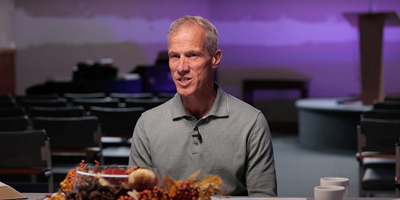Living in this world means periods of great sorrow will be experienced but the prospect for the Christian is the new heaven and new earth in which there will be an eternity with no sorrowful weeping.
“And God will wipe away every tear from their eyes; there shall be no more death, nor sorrow, nor crying. There shall be no more pain, for the former things have passed away” (Revelation 21:4).
In times of sorrow, it can seem that there is no “light at the end of the tunnel”. The darkness of the night looks as though it will never end. However, King David, who for a variety of reasons knew times of weeping, has written a short statement that will bring comfort to every believer.
“Weeping may tarry for the night, but joy comes with the morning” (Psalm 30:5b ESV).
In this verse, “Weeping” is represented as a wanderer, who comes and stays for a night, but in the morning he leaves and another guest, called “Joy” arrives. The reality of sorrow in a period of darkness is readily acknowledged, but there is great comfort in knowing this visitor will not stay forever and an entirely different one will take their place.
A family’s sorrow turns to joy
In John chapter 11 we see a remarkable transformation when the presence and the work of Jesus Christ turns sorrow into joy.
Two sisters, Mary and Martha, wept. Their beloved brother, Lazarus, had died, and it was like night for them. The darkness of weeping and sorrow enveloped them. When the Lord Jesus arrives both sisters make the same statement:
"Lord, if You had been here, my brother would not have died” (John 11:21 & 32).
Jesus answers them differently. To Martha He emphasises His deity.
"I am the resurrection and the life. He who believes in Me, though he may die, he shall live. And whoever lives and believes in Me shall never die. Do you believe this?" (John 11:25-26).
His statement teaches us that resurrection and life are intrinsic to Him. If anyone is trusting in Christ, although they may physically die they will be raised again because they have eternal life. Also, the person who has this life, that comes through faith in the Lord Jesus, will never die spiritually. They are secure and can never be separated from Him.
These doctrinal truths have very real practical implications. An increasing awareness and appreciation of them will cause joy to visit and weeping to leave.
When Jesus reacts to Mary’s statement, we don’t hear any words but observe His humanity.
“Jesus wept” (John 11:35).
When you are mourning the loss of a loved one, have received news of a terrible illness, or have some other cause of intense weeping, you can be assured that Jesus does know and care. He wept at the grave of a loved one.
What happened next proved the claims that He had made to Martha. John, an eyewitness, records:
“He cried with a loud voice, ‘Lazarus, come forth!’” (John 11:43b).
The beloved brother who had died came out of the tomb. The darkness of Mary and Martha’s night gave way to a joy-filled new beginning.
That same voice that raised Lazarus from the dead to live again on earth will one day call all who have died in Christ to be raised to live for ever with Him:
“For the Lord Himself will descend from heaven with a shout, with the voice of an archangel, and with the trumpet of God. And the dead in Christ will rise first. Then we who are alive and remain shall be caught up together with them in the clouds to meet the Lord in the air. And thus we shall always be with the Lord” (1 Thessalonians 4:16-17).
Your sorrow will turn to joy
Shortly after turning Mary and Martha’s night into morning there was another occasion when a night of weeping was turned into a morning of unrivalled joy. Because of the events that took place, there can be real joy after a time of weeping for every believer.
Jesus was with His followers in an upper room when He told them:
“Most assuredly, I say to you that you will weep and lament, but the world will rejoice; and you will be sorrowful, but your sorrow will be turned into joy” (John 16:20).
Shortly after He spoke these words, He was taken away to be crucified. On the cross He suffered excruciating physical pain and His followers wept. But far, far worse was what He suffered from God. From the hand of a holy and just God He bore the punishment for sin. Not His own sin; he had none. But He willingly and completely bore the punishment for the sins of others so that all who will ever trust in Him will not bear it themselves.
He gave His life up and was buried. Jesus was dead. Death brings weeping and sorrow for those who have loved the departed. Jesus had wept at a graveside and His people now wept for Him.
However, weeping would not stay. On the Sunday, women went to the tomb. They heard a message: “He is not here, He has risen” and then,
“Jesus met them, saying, 'Rejoice!'” (Matthew 28:9).
The resurrection of Jesus brought joy then and can bring deep-seated joy now. Because of His resurrection, every believer can be assured that weeping will, one day, depart for ever and joy will arrive.
Earth’s night of weeping will turn to a morning of joy
One consequence of mankind’s rebellion against God is weeping. The earth is filled with sorrow that will never depart until the Lord Jesus returns to the earth.
“I, Jesus, have sent My angel to testify to you these things in the churches. I am the Root and the Offspring of David, the Bright and Morning Star” (Revelation 22:16).
Apparently the Bright and Morning Star appears in the sky before the sun rises. It anticipates and heralds the start of a new day. Just so the coming of the Lord Jesus is like the morning star, the beginning of a bright new day. When He comes, He will destroy the darkness of man's night and bring in God's glorious new day.
Yes, weeping may stay for the night, but joy will come in the morning.
































